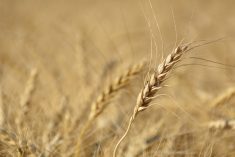At a trade tribunal hearing, you would expect the contentious issues to revolve around trade.
But there was more heated debate about the quality of Manitoba-grown corn than there was around complex trade issues during a Canadian International Trade Tribunal hearing.
Early into week-long discussions about whether imports of United States corn hurt Manitoba farmers, a comment from Shawn McCutcheon of Carman, Man., launched a volley of conflicting testimony about corn quality.
“It seems like an awfully simple answer, but corn is corn,” said McCutcheon, one of four Manitoba corn growers to testify before the panel.
Read Also

Chinese offer complicates canola marketing
Recently the Chinese ambassador indicated that there would be a potential deal between Canada and China regarding the current tariff war.
The growers estimated 70 to 80 percent of Manitoba corn achieves top grades, and has high bushel weights. They dry, screen and clean the corn to improve quality.
McCutcheon and the other farmers said they sell their corn to distilleries and feed mills.
“We can supply the industry with the corn they need,” he said.
But some corn users had different opinions.
Ritchie-Smith Feeds, the largest feed mill in British Columbia, buys American corn because he says it works better in its steam flaking process for dairy feed.
Chuck Poelman, the mill’s chief financial officer, testified the company had “terrible results” with Manitoba corn it received from a broker last summer.
To prepare for the hearing, Poelman’s company bought some more Manitoba corn to test in its process. It has 19 percent shrinkage compared to 11 percent for corn from the United States, he said. The U.S. corn also had larger flakes and was more consistent, said Poelman.
The mill’s dairy nutritionist testified cows prefer steam-flaked corn.
While poultry feed contains ground corn, David Gibson said most feed mills have only one bin available for corn, and thus buy the kind that works best in dairy rations.
Peter Clark, lawyer for the corn farmers, noted a representative of feed giant Landmark Feeds told the panel his company has no problems milling the feed, including for dairy rations.
Witnesses for the Black Velvet Distilling Co. also said they prefer the U.S. corn because it contains dent genetics. Manitoba corn, on the other hand, contains flint genetics that make kernels harder with less starch, said company representatives.
Manitoba corn growers produced a letter from the government-industry relations manager for Pioneer Hi-bred, a major corn seed marketer in North America.
The company doesn’t distinguish between flint and dent genetics in corn, wrote Art Stirling, because Pioneer varieties don’t have significant differences in processing or feed performance.
Users measure quality by test weight, said Stirling.
But broker Jan Leishman produced a letter from a Pioneer Hi-bred breeder in Moorhead, Minn., who said short-season varieties in Manitoba are of different qualities than longer-season varieties grown in the northern U.S. states.
The panel summoned its own witness from the company to testify on the issue.
Bob McFadden said dent and flint are “older terminology” that the company no longer uses.
Rather, Pioneer classifies corn according to bushel weights and yields that can be achieved in different growing regions, said McFadden, regional sales manager for Western Canada.
Starch levels among North American corn varieties vary by only one or two percent, said McFadden, no matter where the corn is grown.
And while Manitoba-grown kernels may be smaller than some U.S.-grown kernels, that doesn’t make a difference, he said.
“I don’t think American corn is any more digestible than Canadian corn.”














